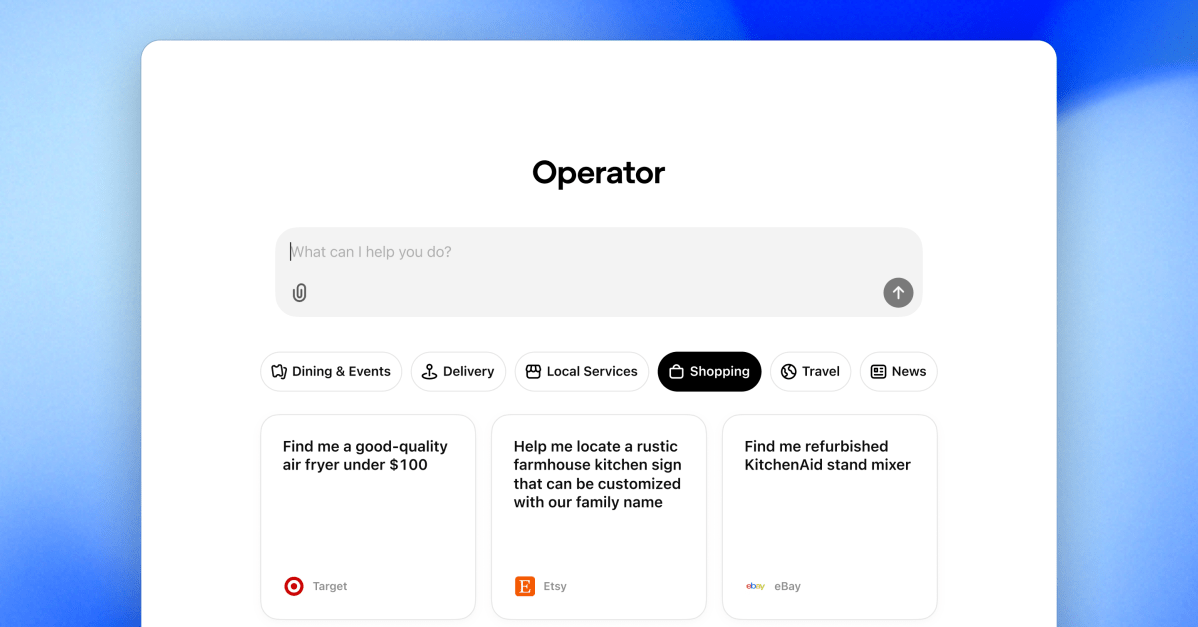The Toy In The Bubble

As someone pretty keyed into the world of tech, I have observed a kind of narrative escalation around AI this week. In some analysis I've heard and read, the news around DeepSeek was the biggest tectonic shift in AI since OpenAI dropped ChatGPT in December 2022. I've seen the geopolitical angle, I've seen the scientific angle, I wrote about the hubris angle. It is all anyone is talking about on the roster of podcasts and newsletters to which I am subscribed. But I want to take a step aside and offer some thoughts on what I think is the most important question surrounding AI: Who gives a shit?
The Promise
Like charismatic preachers looking for the next revival, the men who run the tech industry in the US have spent years now spreading the gospel of AI. They make remarkable claims, nothing short of "We can cure cancer and extend the human lifespan." They have told us from the jump that the stakes really, truly are that high.
And the thing is! They could be right! With AI, we can find sophisticated new ways of analyzing and managing scientific data. The insights we could derive from this analysis really could help us address climate change, really could help us discover cancer inhibiting proteins, or really could help us find inventive new treatments for dementia. And there are companies out there doing this work, pointing their incredibly powerful computers at these datasets and these problems. The only problem is that OpenAI, Google, or Microsoft are not those companies.
To be fair, all three of the listed businesses and their contemporaries do have sizable investments in these utopian ideas. But since that's not where they will make money, they are not where the focus lies.
To be a little uncharitable and blunt, these companies are focussed on making job replacement machines.
Recently, the trend in AI is to build "agentic" systems that can carry out actions for humans.

The promise of these systems is to boost productivity, to ease work-life balance, and to give humans time back to do human stuff, like garden or paint or whatever.
But still I arrive at the same question: Who gives a shit?
I'll tell you who
If they are making job replacement machines, then the "who" is who hires and fires.
I've said it before, but it bears repeating, that the single biggest expenditure for American companies is labor costs. This, after all, is a useful lens through which to observe the now ritual outsourcing of American jobs overseas or the proliferation of the benefit-less, stability-less gig economy.
Given the chance, companies will opt for the cheaper labor option, even if it means deprecation in efficiency, quality, or customer satisfaction. I'm not necessarily placing a value judgement on that here, although I certainly have some feelings about it. But I think it is fair to say.
So whether it's Salesforce or OpenAI or whoever writes the highest checks to A-list Hollywood talent to appear in their commercials, they are trying to sell their vision to the check writers of industry. The thing is, though, is that that is certainly not everyone, and that certainly does not a seismic reorientation of consumer technology make.
Take, for example, the litany of project management software on which much of the American "knowledge" economy runs. Off the top of my head, here are a few: Atlassian's Jira and Confluence, Workday, SAP, Salesforce, Trello. These are successful, meaningful businesses, but what they are not are beloved, transformational technologies. They might improve productivity in one way or another, simplifying things like payroll or task management, but it is not as if every person on planet Earth needs these apps on their phone in order to function in modern society.
Sure, you could argue that I am being overly dismissive, but I would remind AI evangelists that none of their companies are profitable (yet), their products are not societally ubiquitous, and their loftiest claims about what artificial super-intelligence could do are not even halfway validated by their existing consumer tech.
It might be incredibly reductive of me to say, but I still find that AI is still in a "fuck around" phase. They are still trying to convince us of its utility without actually demonstrating utility. When they "find out," it would be really great to let us all know, but for now they are asking for all of the money on the planet (literally) based on what it all could mean.
Idle hands are the devil's playthings
Many of the ways that AI is supposed to change the lives of everyday people amount to new ways of doing old things. Many are just for fun. Want a new way to write emails? Sure! A new way to send emoji? Here ya go. How about a new way to make playlists, or get movie recommendations, or learn what a book is about? Check, check, and check.
I think it might be fair to say, though, that these are not societally transformational ideas. When the internet came around, it did not change that people wanted movie recommendations, just how they got them. AI doesn't feel much different to me.
The ability to generate novelty poems or G-rated fan fiction is not dissimilar to the delight derived from a toy capsule vending machine. The LLM is several incredible leaps and bounds more advanced, but at the end of the day the AI they are trying to sell us looks more like the colorful toys in the crane machine than it does the crane, or the electricity that powers it, or the general human desire for entertainment.
Many examples of AI's purported necessity put forth by the companies attempting to sell it pretty roundly amount to a "Wow, that's neat" from the general public. But you can say the same about a magic trick.
How AI will change the world
Despite all of my skepticism, I do genuinely and actually believe that AI will change the world. I just am suspicious that that'll be done by the companies doing it now focussing on the things that they are now. Here are two examples:
- Imagine a world with the absolute highest efficiency of energy consumption, one where the grid automatically and proactively distributes power according to need and nothing gets wasted. Imagine this on the scale of a home or apartment building too. This is an extremely powerful and not-really-all-that-far-fetched idea for something AI can help us with, providing really meaningful savings in cost and in energy consumption. These same fundamental ideas can map themselves onto water consumption, internet availability, waste management, you name it.
- Imagine a world with the absolute highest efficiency of food distribution. AI can help analyze agricultural output and regional needs to help ensure that proper nutrition is reaching those who need it most. Consider the limitations and challenges of urban farming, like space or the need for nutrient dense soil. Using AI we can optimize the output of these types of institutions to decrease reliance on distant factory farms, saving on the costs and emissions of trucking fresh vegetables across the country.
Why I think it's a bubble
There are a bunch of reasons, but as it relates to the theme of this newsletter the answer basically boils down to a derisive dismissal that the productivity or cost benefits on the other side of this first AI wave will outpace the insane level of investment. Websites and web services did not disappear after the Dot com bubble burst, houses and property did not disappear after the housing crisis. AI will not disappear, but if the bubble pops, what is left might not look like what we see today.






